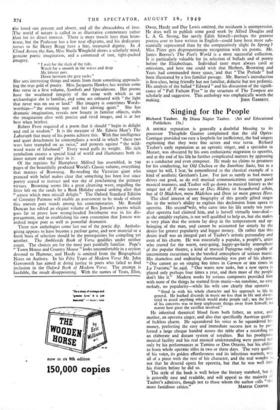Singing for the People
Richard Tauber. By Diana Napier Tauber. (Art and Educational Publishers. 15s.)
A DOUBLE reputation is generally a doubtful blessing to its possessor Theophile Gautier complained that the old Opera- Comique provided too easy a loophole for inefficiency, the bad singers explaining that they were fine .actors and vice versa. Richard Tauber's early reputation as an operatic singer, and a specialist in Mozart, was obscured by his own enthusiastic migration to operetta, and at the end of his life, he further complicated matters by appearing as a conductor and even composer. He made no claims to greatness for his conducting, for Old Chelsea or the Sunshine Suite, but as a singer he will, I fear,-be remembered as the classical example_of a kind of aesthetic Gresham's Law. For just as surely as bad money drives out good, so do evil musical communications corrupt good musical manners, and Tauber will go down to musical history as the singer not of 11 mio tesoro or Dies Bildnis 1st bezaubernd schlin, but of 0 Madchen, mein Mildchen and Dein ist mein gauzes Herz.
The chief interest of any biography of this greatly gifted singer lies in the writer's ability to explain this declension from opera to operetta. His secondbrife, who came into his life nearly ten years after operetta had claimed him, and is herself virtually tone-deaf— as she amiably explains, is not well qualified to help us, but she makes it very plain that the reason lay deep in the temperament and up- bringing of the man, and cannot be accounted for simply by the desire for greater popularity and bigger money. Or rather that this desire itself was an integral part of Tauber's artistic personality and even of his charm, He was essentially a popular, a people's, artist who craved for the warm, easy-going, happy-go-lucky atmosphere of the popular theatre, a kind of musical Papageno only capable of intermittent excursions in the 'rarefied atmosphere of serious music. His shameless and endearing showmanship was part of• his charm. " One cannot go on singing 800 times in Carmen or 90o times in La 7'raviata," " One wants new tasks, but a new opera is played only perhaps four times a year, and then most of the people don't like it." Modern works by serious composers provided him with none of the things he wanted from music—no sunshine, no easy melody, no popularity—while his wife saw clearly that operetta " fitted in with his whole character and his approach to life in general. He loathed discords in music no less than in life and always tried to avoid anything which would make people sad ; not the least of his concerns was to keep unpleasant things away from himself, no matter how great the sacrifice involved."
He inherited theatrical blood from both father, an actor, and mother, an operetta singer, and also that specifically Austrian quality of feckless charm. He squandered his voice as he squandered his money, preferring the easy and immediate success just as he pre- ferred a large cheque handed across the table after a recording to an elaborate and distant system of royalties. But his prodigious musical facility and his real musical understanding were proved not only by his performances as Tamino or Don Ottavio, but his abilit\ to learn whole operatic roles in two or three days. The very quay' of his voice, its golden effortlessness and its infectious warmth, %% all of a piece with the rest of his character, and the real wonder not that he dem-id opera for operetta, but that he was well into his thirties before he did so.
The style of the book is well below the literary standard, but is generally easy and readable, and will appeal to the majority o' Tauber's admirers, though not to those whom the author calls "tl'






























 Previous page
Previous page